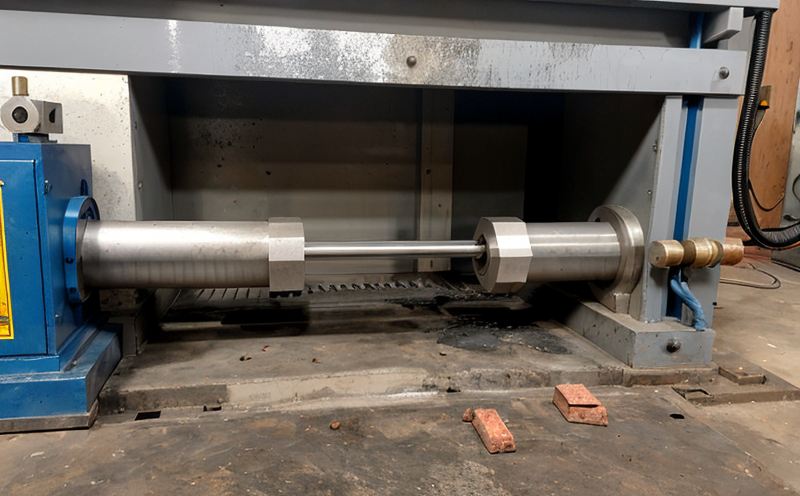ASTM C78 Flexural Strength of Concrete Validation Method Development Test
The ASTM C78 test method is a critical tool in the evaluation and validation of concrete flexural strength, particularly for quality assurance and research purposes. This method provides a standardized approach to determine the flexural strength of concrete under controlled conditions, ensuring consistency across laboratories and projects.
Flexural strength testing is vital in the construction industry as it helps assess the durability and integrity of reinforced concrete structures. By validating this test method through ASTM C78, manufacturers and researchers can ensure their processes meet rigorous international standards. This service plays a pivotal role in upholding quality control measures while providing essential data for product development.
The ASTM C78 procedure involves subjecting standard-size prisms to flexural loading until failure occurs. Specimens are cured under specific conditions that simulate real-world environmental factors, ensuring the results accurately reflect how concrete will perform in actual applications. The test setup includes specialized equipment such as hydraulic testing machines capable of applying controlled loads.
A key aspect of ASTM C78 is its emphasis on reproducibility and reliability. By adhering strictly to prescribed parameters, including temperature control during specimen preparation and curing, laboratories can produce consistent results across multiple trials. This ensures that any deviations from expected outcomes are due to material properties rather than procedural inconsistencies.
The test method also allows for the customization of certain variables like loading rate or environmental conditions if specific research questions require it. However, these modifications must be validated against standard procedures prior to implementation in routine testing protocols. Proper documentation and justification are necessary when altering any aspect of the ASTM C78 procedure to maintain compliance with international standards.
Developing a validation method based on ASTM C78 requires thorough understanding not only of the test itself but also its broader implications for concrete quality assurance programs. It involves collaboration between technical experts who understand both laboratory practices and real-world applications, ensuring that any adjustments made do not compromise accuracy or reliability.
In summary, the ASTM C78 Flexural Strength of Concrete Validation Method Development Test provides a robust framework for assessing concrete performance while allowing flexibility when necessary. Its significance lies in its ability to balance strict adherence to international standards with practical considerations relevant to specific projects and industries.
Industry Applications
The ASTM C78 test method finds extensive application across various sectors within the construction industry, particularly focusing on the evaluation of reinforced concrete structures. Engineers use this testing procedure during product development stages to ensure materials meet required specifications before being incorporated into larger projects.
- Structural Integrity Checks: During design phases, structural engineers often perform ASTM C78 tests to validate the performance characteristics of proposed concrete mixes under anticipated loading conditions.
- Material Selection: Manufacturers rely on this test method when selecting raw materials for their products, ensuring consistency in quality across batches. It helps identify optimal mix designs that balance strength requirements with cost efficiency.
- Quality Assurance Programs: Construction companies integrate ASTM C78 into their internal QA protocols to monitor production processes continuously and address issues early on before they impact final product performance.
The data obtained from these tests serves as critical input for decision-making regarding material selection, process optimization, and project planning. By leveraging this standardized testing methodology, stakeholders can enhance confidence in the reliability of their products and services while adhering to global best practices.
International Acceptance and Recognition
- ISO: ASTM C78 aligns closely with ISO standards for concrete testing, reflecting its widespread acceptance among international organizations.
- ASTM International: Developed by ASTM International, this test method is widely recognized throughout North America and has gained substantial traction globally.
- EN Standards: Many European countries have adopted ASTM C78 as part of their national standards for concrete testing.
The global recognition of ASTM C78 underscores its importance in maintaining consistent quality across diverse geographies. Compliance with this test method ensures that results are comparable and interpretable worldwide, facilitating smoother international collaborations between suppliers, manufacturers, and end-users.
Use Cases and Application Examples
| Use Case | Description | Expected Outcome |
|---|---|---|
| R&D Project Validation: | Incorporating ASTM C78 into R&D projects allows for precise evaluation of new concrete formulations, providing insights into their potential performance. | Prediction of future product capabilities based on current test results. |
| Supplier Evaluation: | Evaluating supplier compliance by performing ASTM C78 tests ensures adherence to set quality standards throughout supply chains. | Demonstration of consistent performance across multiple batches from different suppliers. |
| New Construction Site Monitoring: | Monitoring concrete strength during early stages of construction helps identify potential issues promptly, preventing costly delays later on. | Avoidance of substandard materials leading to stronger and more durable structures. |
| Rehabilitation Projects: | Evaluating the condition of existing concrete structures using ASTM C78 aids in planning effective rehabilitation strategies. | Detailed assessment of current structural integrity for informed decision-making regarding repairs or replacements. |
| Research Studies: | Conducting rigorous ASTM C78 tests supports academic and industrial research efforts aimed at advancing knowledge about concrete behavior under various loading scenarios. | Publication of findings contributing to the broader scientific community's understanding of concrete properties. |
| Quality Assurance Audits: | Incorporating ASTM C78 into regular quality assurance audits enhances confidence in reported test results, ensuring accurate documentation and reporting practices. | Evidence of adherence to best practices supporting continuous improvement initiatives within organizations. |
| Forensic Analysis: | Performing ASTM C78 tests on failed concrete specimens provides valuable information for forensic analyses aimed at identifying root causes behind structural failures. | Detailed analysis leading to recommendations for preventing similar incidents in the future. |
The versatility of ASTM C78 makes it applicable across numerous scenarios, from initial R&D projects to ongoing quality assurance audits. Its ability to generate reliable and repeatable results contributes significantly towards maintaining high standards throughout the entire lifecycle of concrete products and structures.





